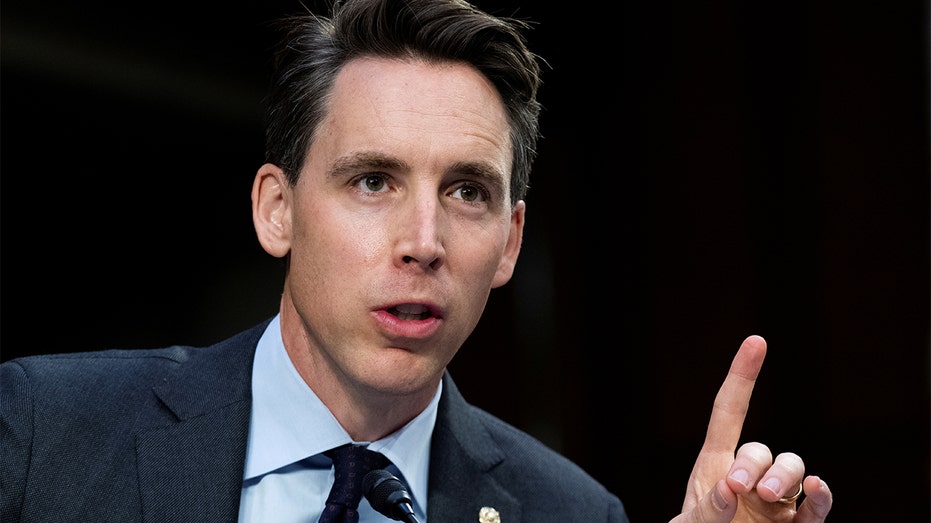FIRST ON FOX: Republican Sen. Josh Hawley is rolling out a measure amid the supply chain crisis that would identify key goods critical to U.S. national security and impose local content requirements for them – requiring 50% or more of the value of the good be produced in the United States.
The bill, called the Make in America to Sell in America Act, lays out a “bold” vision to “revitalize American manufacturing while securing critical supply chains.”
WHITE HOUSE HAILS ‘SERIOUS PROGRESS’ ON SUPPLY CHAINS DESPITE RECORD BACKLOG AT CALIFORNIA PORTS
The bill would require multinational corporations to make more critical goods in the United States by instituting local content requirements to boost new investment in domestic manufacturing.
Hawley’s office said his bill would also end the “dangerous overreliance on foreign factories,” which it says has largely contributed to the bottlenecks and backlogs of the supply chain in recent months.
“For decades, Washington elites shipped American jobs overseas while factories throughout the country were shuttered, leaving us perilously reliant on foreign manufacturing,” Hawley told FOX Business. “The COVID pandemic, disastrous lockdown policies, and Joe Biden’s war on American energy have exposed just how misguided these choices were and everyday Americans are now paying the price.”
Hawley added that “shelves are empty. Prices are rising, and the trade deficit is at a record high.”
“Now is the time for a bold, new economic agenda that will restore the American heartland and put American workers before corporate profits,” Hawley said. “We cannot let this moment pass and return to Washington’s failed economic consensus.”
Hawley’s bill would direct the Department of Commerce to consult with the Department of Defense in producing an annual report that identifies “finished and intermediate” manufactured goods that are critical for the national security of the United States, or the protection of the industrial base of the United States.
The bill would also require that those goods identified by the Commerce and Defense departments be subject to the local content requirement of over 50% – meaning that more than 50% of the value of the good must be produced in the United States in order to be sold commercially in the country.
Hawley said that requirement would go into effect three years after enactment.
The bill would also enforce requirements similar to anti-dumping duties, where domestic manufacturers can petition the International Trade Commission and the Department of Commerce for enforcement actions against importers of goods that fail to meet the new standards.

Hawley’s proposal comes amid a supply chain crisis that the Biden administration is attempting to grapple with by calling for 24/7 operations at some of California’s largest ports, Los Angeles and Long Beach, and the commitments from private companies like Walmart, UPS and FedEx to also move to a 24/7 model.
The White House this week hailed the “serious progress” being made in the days following President Biden’s efforts to quell the record bottlenecks in the supply chain.
But the number of ships waiting to enter those ports Monday hit a record high, with data from the Marine Exchange reporting a total of 157 ships waiting at the ports in Los Angeles and Long Beach. As of Monday, 100 ships were at anchor and 57 were at berths.
Nevertheless, White House press secretary Jen Psaki on Tuesday said Biden “is satisfied that progress continues to be made.”
“And one of the reasons that there has been so much traffic in a lot of these ports is because there are more goods that are being ordered by people across the country,” Psaki said, touting the economy under the Biden administration. “People have more money, expendable resources, their wages are up, more people are working than they were a year ago.”
But as the backlog grows in the California ports due to a record number of container ships waiting at sea, the Port of Savannah is also starting to see congestion as nearly two dozen ships wait off the Georgia coast.
Retailers and the White House issued a stark warning to consumers with regards to holiday shopping, urging they buy gifts early as the shipping crisis stifles production.
Supply chain issues are a source of mounting concern as global economies attempt to meet surging demand and recover from the COVID-19 pandemic.
Shortages of basic household items, such as toilet paper, raw materials needed for construction and critical tech components, such as semiconductors, have contributed to a surge in prices for consumers.
Meanwhile, Transportation Secretary Pete Buttigieg said Sunday that America’s supply chain disruptions are expected to continue into next year, also claiming that the bottleneck has been spurred, in part, by an unprecedented amount of demand brought on by Biden’s economic recovery.
Read the full article here











